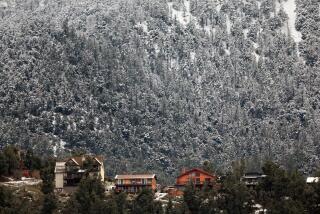Gorbachev & the Three Bears: Fat, Hungry or Maybe Unhinged : Soviet Union: Many countries have gone through huge upheavals, but none to date has been a nuclear superpower.
- Share via
Events in the Soviet Union and Eastern Europe seem to be running ahead of the ability to analyze them. Yet while attention on the eve of the summit has shifted toward Central Europe because of the dramatic changes in East Germany and Czechoslovakia, developments within the Soviet Union could well force us to reconsider the very way we look at that superpower.
Ever since relations with the Soviet Union came to center stage 4 1/2 decades ago, there has been an underlying debate: Which is better, the “Hungry Bear” or the “Fat Bear”? Was the Hungry Bear more likely to be a predator, or would economic constraints restrict its freedom to prowl? Would a Fat Bear--a relatively better-off Soviet Union, and one more interdependent with the West--be more content, more benign and less aggressive? Or would it simply be able to spend more on arms and prove more capable of extending its grasp? Those, for instance, who believed that the Hungry Bear was more in Western interests tried in the early 1980s to prevent planned Soviet gas exports to the West in order to limit hard currency earnings that they thought would go to feed the Soviet war machine. Those who thought the Fat Bear preferable sought in earlier years to promote East-West trade and are at present trying to expand American-Soviet economic relations.
But the unfolding drama within the Soviet Union is now bringing to the fore a third image, and a disturbing one--the “Bear Unhinged.” What could be the consequences of an unstable, disordered Soviet Union--both for itself and for the world? To focus the matter simply: While many countries have gone through huge upheavals and transformations, none to date has been a superpower with nuclear weapons.
Enough elements are there to make this a credible image. And, indeed, it is a concern that has found its way, in the form of warnings, into Gorbachev’s own speeches. Enthusiasm within the Soviet Union has now given way to gloom and anxiety. Glasnost proceeds, but perestroika is in serious trouble. The political system is being transformed, but the economic reforms have stalled.
On top of the economic dislocation is the question of governance. The multinational Soviet state has been held together by three factors--ideology, force and Russian nationalism. Much of the ideology has been challenged by the “new thinking” and, de facto, by the wholesale re-examination of Soviet history. With the intellectual monopoly lifted, a host of tendencies has erupted within Russia--reformist, liberal, democratic, Slavophile, nationalistic, religious, mystical--some tolerant and some not.
The true testing could come with the ethnic minorities, which are now asserting their will and whose nationalism could mean a challenge to the present concept of the Soviet Union. It is one thing to let a bankrupt Poland or an entrepreneurial Hungary struggle to find its own independent road. But how will the center react over time as constituent parts of the Soviet Union step up their agitation for greater autonomy--or even more than that? At some point, one or the other of the republics may well ignore Moscow’s warning not to go too far.
In a chaotic, contentious, fast-moving political situation, the engineering of a Soviet version of a “soft landing” will hardly be easy.
To what degree can the West affect the outcome? Gorbachev’s domestic position will be strengthened by an aura of accomplishment and seriousness at the summit. But further steps on arms control will not deal with the Soviet Union’s immediate economic crisis. Enhancement of long-term economic and trade packages will help, but again not in the immediate crunch. Will we see short-term economic and trade packages that will get food and goods back in the stores? Here there is room for ingenuity.
We need to widen our thinking to include the likes of the Bear Unhinged. Along with glasnost and perestroika , a third Russian word should be added to our vocabulary. It is besporyadok . It means disorder, and it is a concept with deep resonance in Russian history. One of the first Slavonic works, “The Primary Chronicle” of the 11th Century, declares, “Our land is great and rich, but there is disorder in it.” The crumbling of the Brezhnev state has brought openness, excitement, greater freedom, optimism, hope--and change on a scale that would have been considered impossible half a decade ago. It has also brought uncertainty, shortages, anxiety, fear--and disorder and dissension. Disorder and the fear thereof could, as in the past, bring diverse results--some still unexpected and not all of them by any means pleasant.
More to Read
Sign up for Essential California
The most important California stories and recommendations in your inbox every morning.
You may occasionally receive promotional content from the Los Angeles Times.










